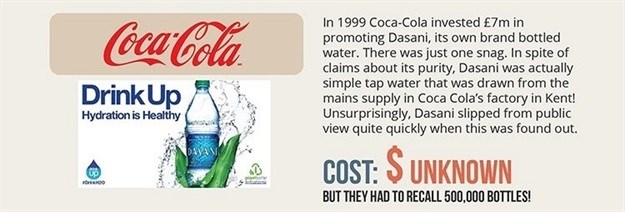
In the wake of the recent VW emissions scandal where software was fitted to deliberately fool tests, we look at 10 other times big businesses have lied to their customers.
A business and all of its brands achieves the status of trustworthiness by creating and selling unfailing products that deliver on their stated brand promise. Once trust is lost, it is really almost impossible to regain.
I am saying 'almost impossible' because redemption is a very powerful act if it is delivered with great authenticity and offered with powerful sincerity after a company has behaved very badly. Lying companies do survive the lies! I mean Coca-Cola, Nestle and many more bottled water companies made billions while lying about the source and purity of their product compared to tap water in the developed world. These companies are still in business today, making billions.
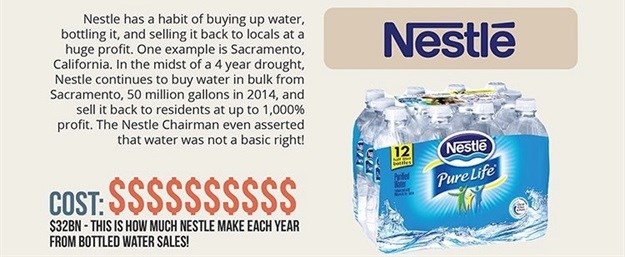
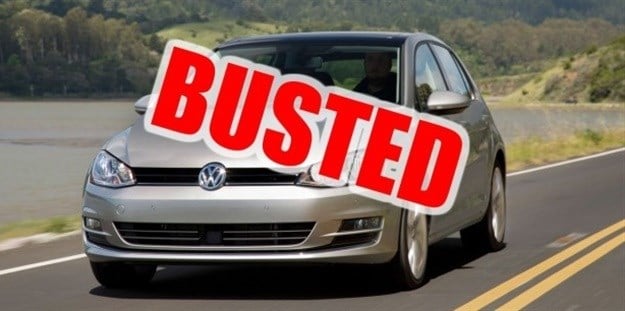
First it was Volkswagen. Now Mitsubishi has been forced to apologise after confessing it had exaggerated the fuel economy of more than 600,000 cars. Japanese government officials have raided one of its offices and research facilities, forcing the company's share price to drop to an all-time low.
On the same day, Volkswagen reached an agreement in the United States to compensate half a million American owners of its diesel-powered cars. In what some are starting to call an international pattern of cheating in the car industry, the German car-maker was found to be falsifying its emission data last year.
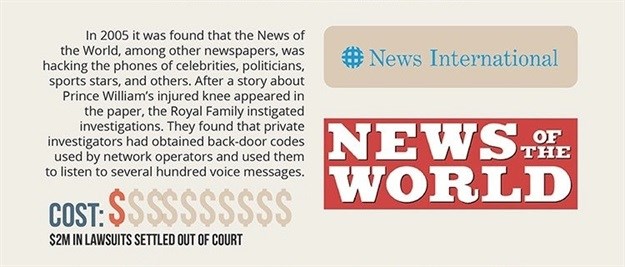
The International Council On Clean Transportation is an independent non-profit organisation founded to provide unbiased research to environmental regulators. One day, the council, working with West Virginia University, began a routine emissions test of three vehicles – a VW Passat, a VW Jetta and a BMW X5. The BMW passed the test, but both VW models not only failed but failed spectacularly – emitting 7-to-25 times the acceptable emission limits of nitrogen oxides. Later, those results were reported at a conference, which got the attention of the US Environmental Protection Agency. The agency then tested more VW vehicles, and the results were consistently over the limit. When the EPA threatened to block sales of VW's 2016 models, it forced Volkswagen to admit it had installed the deception device.
History is littered and fraught with companies who lied to consumers to gain greater profits. Year after year, companies use the biggest lies to dupe unsuspecting consumers. Everyone would like to believe that the majority of companies have the consumers’ best interests at heart when developing and marketing their products, but that’s often not the case.
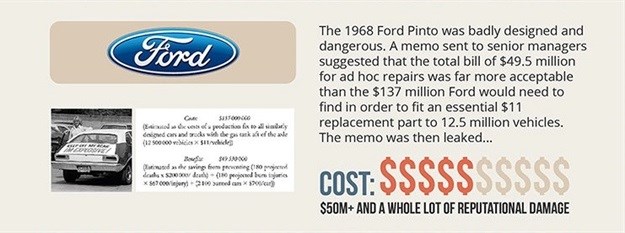
In an attempt to increase profits, some of the most well-known companies have used shameful lies and marketing ploys never proven to be true to rack up more profit and dupe unsuspecting consumers.
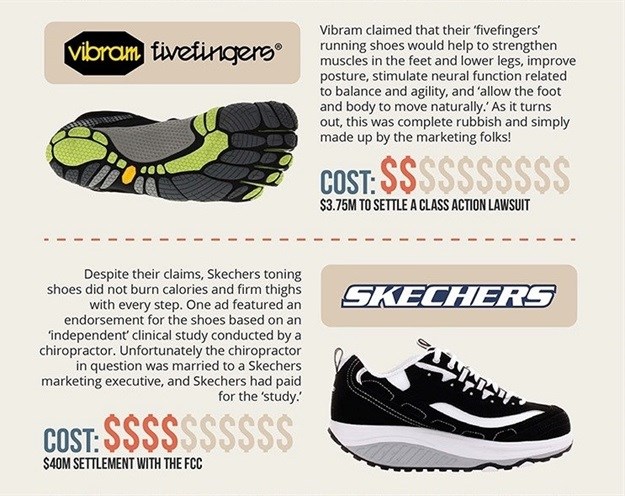
In Phishing for Phools: The Economics of Manipulation and Deception, Nobel Prize–winning economists George Akerlof and Robert Shiller deliver a fundamental challenge to these unethical phenomena of marketing and selling of lies to consumers, arguing that markets harm as well as help us. As long as there is profit to be made, sellers will systematically exploit our psychological weaknesses and our ignorance through manipulation and deception. Rather than being essentially benign and always creating the greater good, markets are inherently filled with tricks and traps and will "phish" us as "phools."
Phishing for Phools therefore strikes a radically new direction in economics, based on the intuitive idea that markets both give and take away. Akerlof and Shiller bring this idea to life through dozens of stories that show how phishing affects everyone, in almost every walk of life. We spend our money up to the limit, and then worry about how to pay the next month’s bills. The financial system soars, then crashes. We are attracted, more than we know, by advertising. Our political system is distorted by money. We pay too much for gym memberships, cars, houses, and credit cards. Drug companies ingeniously market pharmaceuticals that do us little good, and sometimes are downright dangerous.
Phishing for Phools explores the central role of manipulation and deception in fascinating detail in each of these areas and many more. It thereby explains a paradox: why, at a time when we are better off than ever before in history, are all too many of us leading lives of quiet desperation? At the same time, the book tells stories of individuals who have stood against economic trickery — and how it can be reduced through greater knowledge, reform, and regulation.
Robert Shiller: “A fundamental concept of psychology is that people often make decisions they’re not happy about. That’s why people go see therapists! If businesses have a chance to profit by tempting us into making decisions that are good for them but bad for us, they will take it. They have just as powerful an incentive to provide us with what we don’t want as to provide us with what we do want.”
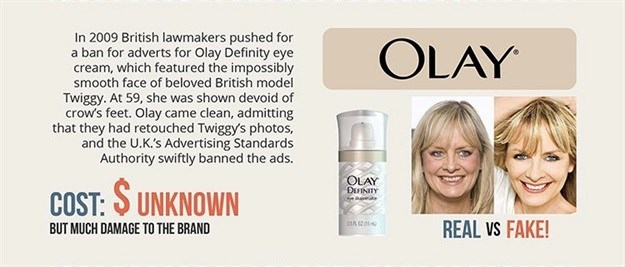
Let's be candid, there are industries and businesses we actually expect to lie to us, whose revenue is enhanced when they don’t tell their customers the truth.
One good example is the cosmetics industry. If you don’t understand how the cosmetics industry works — the good, the bad, and the ugly — you will be a victim of its advertising manipulations, exaggerations, and deceptions, and that isn’t good for your skin or your budget. What most women don’t realise is how everyone in the cosmetics industry knows that the marketing and advertising for cosmetics is either meaningless, hypocritical, or dishonest.
The simple answer is that those who constantly seek everlasting beauty, eternal youth and want to be aesthetically pleasing to the eyes of the world like to be lied to. We want to believe that the products we buy can get us what we want. We prefer the promise of eternal youth (or some approximation), clear, silky hair and flawless skin to reality. No matter how many thousands of products there are, often dozens of them from the same companies, and all guaranteeing some degree of a miracle, it still happens — we just don’t seem to have a learning curve. We want the next one we buy to be the answer. Using either scientific mumbo jumbo or concoctions said to come straight from the earth, or a mix of both, they tell us exactly what we want to hear. Most cosmetics companies need to lie just to gain a consumer’s attention because the truth is never as enticing as the deception.
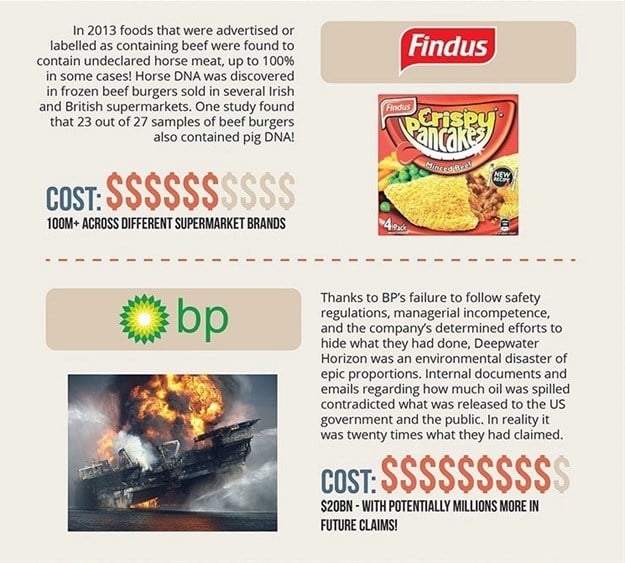
The death of caveat emptor leads us to rely in a general way upon the truth of claims asserted in marketing and advertising. (Even when we shouldn't.)
Whether marketers lie knowingly when they do their job or are just innocent participants when a company they work for plots lies and deceptions, the fact remains that their myriads of pervasive marketing communications market lies and deception. It is therefore a no-brainer that marketers in such companies lie as well.
Marketers are trained extremely well on how to spin, how to write elegantly, how to stay in the brand voice, etc. We’re also trained brilliantly on how to lie and how to lie well. In all honestly, we lie so well that sometimes we don’t even realise we are doing it. All of the half-truths, omissions, and spin we put on all of our marketing pieces could be what is holding us back from an authentic connection with the exact audience we’re trying so desperately to attract. It could be argued that we’ve become such good liars that we can’t even tell the difference between lies and truth anymore.
When a person tells a lie, they have to deal with the consequences in their own life. But when a marketer lies, it discredits the entire marketing and advertising industry. Throwing shade on hard working and honest companies and marketers who value their customers’ trust. Lying about the performance of your products and the excellence of your services doesn’t pay off any more. That’s because when you fabricate a story that just doesn’t hold up to scrutiny, you get caught. Fast. It doesn’t take long for the reality to catch up with the story. It’s tempting to spin a tall tale about a piece of technology or a customer service policy, but once we see it in the wild, we talk about it and you wither away or you survive with tainted reputation.
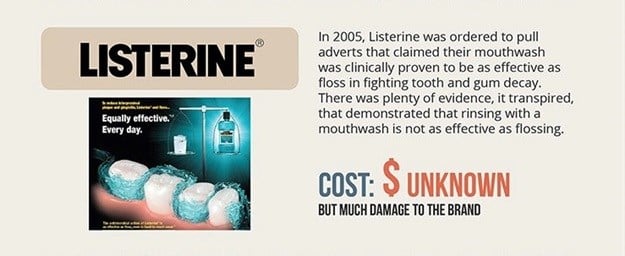
Being a great marketer does not have to mean being a great liar!
It all starts with having a really sensitive radar for spin, omissions, and lies. Start scrutinising every piece of information you communicate to your target markets. Ask yourself, "Will this hold up to scrutiny?

The irony that underpins every story about marketers who lie is that the company they work and lie for has to be trusted before it can deceive. Or else no one will believe the lie. This is called ‘reputation mining’. Once trust is earned, consumers lower their guard when they should be careful and alert at all times during the pre-purchase period, often with unpleasant consequences.
Authors of Phishing for Phools and Nobel laureates Robert J. Shiller and George Akerlof explain:
George Akerlof: “Let’s say you have this reputation for selling wonderful avocados. Then you have the opportunity to start selling people awful avocados if that’s more profitable. We think that’s how things [happened] in financial markets [before] the 2008 financial crisis.”
Robert Shiller: “Financial markets are a special case because they present, for most people, a very difficult judgment about the future: What is this market going to do? It invites a kind of exploitation of them by storytellers, people who will play tricks on them to get their money to manage. In many cases, they’re more sales and marketing people than market researchers.”
In conclusion, it is true that companies and marketers might try to take advantage of consumers and investors, perhaps with outright lies, perhaps with subtler forms of deception, perhaps by manipulating their emotions. But from the standpoint of standard marketing and economic thinking, that’s nothing to panic about. The first line of defence is competition itself — and the market’s invisible hand. Companies and marketers that lie, deceive, and manipulate people are not going to last long if they continue lying, deceiving and manipulating consumers. The second line of defence is the law. If a company is really engaging in fraud or deception, government regulators might well get involved, and customers are likely to have a right to compensation.
But for economists and marketers, competitive markets are generally trustworthy, and so the old Latin phrase retains its relevance: caveat emptor.
The companies and brands mentioned on this article, and many more not mentioned, all had long-standing good reputations. All had so much to lose. Whether they lose so much is debatable.
*Note that Bizcommunity staff and management do not necessarily share the views of its contributors - the opinions and statements expressed herein are solely those of the author.*
